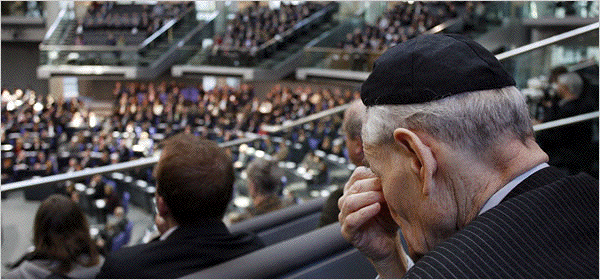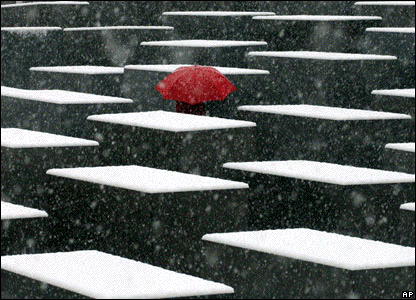.
Memo From
Berlin
Germany Confronts
Holocaust Legacy Anew
By Nicholas Kulish and Victor
Homola
January 29, 2008.

|
|
Rabbi
William Wolff attends a commemoration of
Holocaust victims in the German parliament in
Berlin. (January 25, 2008.)
|
BERLIN -- Most countries
celebrate the best in their pasts. Germany unrelentingly
promotes its worst.
The enormous Holocaust memorial
that dominates a chunk of central Berlin was completed
only after years of debate. But the building of monuments
to the Nazi disgrace continues unabated.
On Monday, Germany's minister of
culture, Bernd Neumann, announced that construction could
begin in Berlin on two monuments: one near the Reichstag,
to the murdered Gypsies, known here as the Sinti and the
Roma; and another not far from the Brandenburg Gate, to
gays and lesbians killed in the Holocaust.
In November Germany broke ground
on the long-delayed Topography of Terror center at the
site of the former Gestapo and SS headquarters. And in
October, a huge new exhibition opened at the
Bergen-Belsen concentration camp. At the Dachau camp,
outside Munich, a new visitor center is set to open this
summer. The city of Erfurt is planning a museum dedicated
to the crematoriums. There are currently two exhibitions
about the role of the German railways in delivering
millions to their deaths.
Wednesday is the 75th
anniversary of the day Hitler and the Nazi Party took
power in Germany, and the occasion has prompted a new
round of soul-searching.

A visitor walking through the snow-covered
Holocaust Memorial in Berlin.
(January 2008)
|
|
"Where in the world has one ever seen a nation that
erects memorials to immortalize its own shame?" asked Avi
Primor, the former Israeli ambassador to Germany, at an
event in Erfurt on Friday commemorating the Holocaust and
the liberation of Auschwitz. "Only the Germans had the
bravery and the humility."
It is not just in edifices and
exhibits that the effort to come to terms with this
history marches on. The Federal Crime Office last year
began investigating itself, trying to shine a light on
the Nazi past of its founders after the end of the war.
And this month Germany's federal prosecutor overturned
the guilty verdict of Marinus van der Lubbe, the
Communist Dutchman executed on charges of setting the
Reichstag fire; that event's 75th anniversary is Feb.
27.
The experience of Nazism is
alive in contemporary public debates over subjects as
varied as German troops in Afghanistan, the nation's low
birthrate and the country's dealings with foreigners. Why
Germany seems unendingly obsessed with Nazism is itself a
subject of perpetual debate here, ranging from the
nation's philosophical temperament, to simple awe at the
unprecedented combination of organization and brutality,
to the sense that the crime was so great that it spread
like a blot over the entire culture.
Whatever the reasons, as the
events become more remote, less personal, this society is
forced to confront the question of how it should enshrine
its crimes and transgressions over the longer
term.
In the decades after the war,
the central question was how Hitler ever came to power,
Horst Möller, director of the Institute of
Contemporary History, said in an interview. Even an
American television mini-series called "Holocaust" in the
1970s affected the debate in what was then West Germany,
shifting the focus more onto the suffering of the victims
themselves, Mr. Möller recalled.
Rüdiger Nemitz first began
welcoming back Berlin's exiled victims of Nazi tyranny,
an overwhelming majority of them Jews, in 1969. Berlin
flies its former citizens back for a week of visits, all
expenses paid and complete with a reception by the
mayor.
The Invitation Program for
Former Persecuted Citizens of Berlin, which has brought
roughly 33,000 people for visits to the city, once had 12
full-time staff members. Now it is just Mr. Nemitz and a
half-time employee.
The program is not, however,
winding down because of waning support. At a time when
the Berlin city government has had to make deep cutbacks
in other areas, Mr. Nemitz said, the program's $800,000
budget has not been pared since at least 2000.
"When it started, they were
grown-ups," said Mr. Nemitz from his office on the ground
floor of City Hall. "Now, it's people with hardly any
memory of Berlin. Those who come today were children
then." The visits will end in 2010 or 2011, Mr. Nemitz
estimated, because there are so few victims
left.
Overlooked next to the fact of
the survivors' dying out is that Mr. Nemitz's generation,
those who fought to break the silence of their parents
and teachers, is starting to retire. When the last tour
group leaves Berlin, Mr. Nemitz, 61, who says he is
afraid to take vacations and treats his position more
like a mission than a job, will shut the door to his
office and retire.
|
|
A nation
pays more attention than ever to the
consequences of its past, and lessons for the
future.
|
Some say that young Germans, who are required to study
the Nazi era and the Holocaust intensively, have shown
little indication of letting the theme drop, despite
their distance from the events. They say that the younger
generation has tackled it as a source not of guilt, but
of responsibility on the world stage for social justice
and pacifism, including opposition to the war in
Iraq.
Others say that the crimes are
dealt with only superficially, and that the young will
eventually, and perhaps in carefully guarded ways,
express their exhaustion with the topic. "I can't help
but feeling that some of the continued, 'Let's build
monuments; let's build Jewish museums,' is a fairly
ritualized behavior," Susan Neiman, director of the
Einstein Forum in Potsdam, an international public
research group, said by telephone. "I worry terribly that
it's going to backfire."
Germany's relationship with its
Nazi history still regularly generates controversy, as in
the case of the dueling train exhibits. The first, Train
of Commemoration, is a locomotive carrying displays
detailing the way Jewish children were murdered in the
Holocaust.
The train is making its way
through German cities, open for visitors along the way,
ultimately bound for the site of the Auschwitz camp, in
Poland. Organizers complain that rather than embrace the
project, the national railway, Deutsche Bahn, has
hindered it, requiring payment for use of the
tracks.
The second exhibition, sponsored
by Deutsche Bahn itself, opened in Berlin at the
Potsdamer Platz train station last week. Critics have
derided "Special Trains to Death" as a response to the
first exhibition. But Deutsche Bahn's exhibition does lay
out how the company's predecessor, the Reichsbahn,
carried some three million passengers to their deaths; it
is filled with painful statistics, photographs and
powerful stories of some of the people who
perished.
Any failure to handle the
history with care grabs national attention. In Munich
this past weekend, a traditional carnival season parade
overlapped with the International Holocaust Remembrance
Day, observed every year on Jan. 27. The result was a
flood of negative publicity for the city.
Stefan Hauf, a spokesman for the
city, said, "There was no conscious affront," adding that
the city would have changed the date of the parade, but
that too many participants were flying in from other
countries to make the change on short notice.
Munich played a special role in
Nazi history. It is where the National Socialist party
rose to prominence and was the location of the Beer Hall
Putsch of 1923, the failed coup attempt enshrined in Nazi
lore. Hitler eventually declared it the Capital of the
Movement. Unlike Berlin, which has developed a reputation
as a city with a memorial on practically every street
corner, Munich has often been criticized for playing down
its history.
"Munich was the Capital of the
Movement; since 1945 it's been the capital of
forgetting," said Wolfram P. Kastner, an artist who said
he had fought the city over the years for permission to
use performance art to keep the memory of the Holocaust
alive there.
Munich's government believes it
has been very active in preserving the history of that
time. A short walk from the city's historic Marienplatz,
an entire complex of new buildings is devoted to both the
city's Jewish history and the present. The synagogue
there opened in November 2006 on the anniversary of the
Nazi-led Kristallnacht attacks on Jewish people,
businesses and places of worship. The Jewish Museum and a
new community center opened in Munich last
year.
The city is working on a new
museum to be built where the Nazi party headquarters once
stood. Called the Documentation Center for the History of
National Socialism, it is expected to open in 2011. The
stated goal, according to the museum Web site, "is to
create a place of learning for the future."
To that end, Angelika Baumann of
the city's Department of Arts and Culture has run
workshops for schoolchildren 14 to 18 years old. "We're
planning for people who aren't even born yet," she
said.
